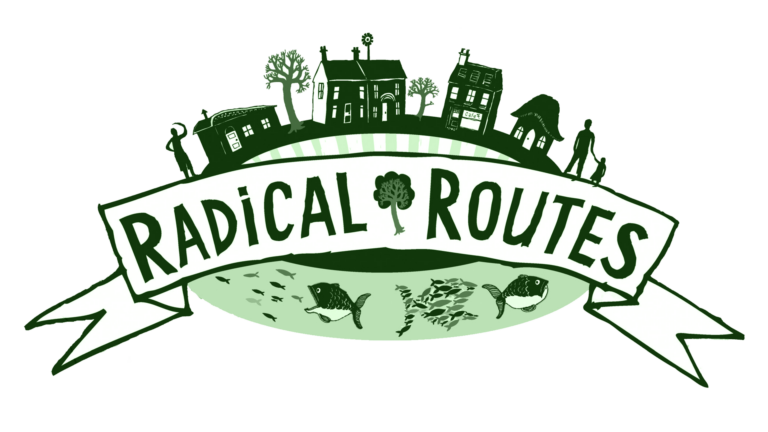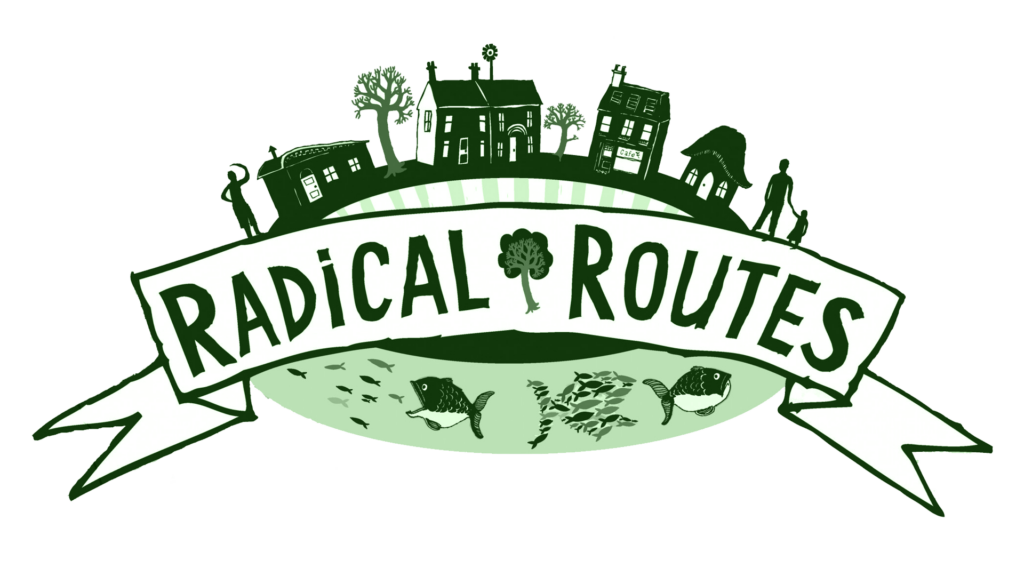Like every community and organisation, over the years we’ve developed terms that make sense when you’ve heard them many times before, but not if you’re new or don’t know much about co-ops or consensus or accounting or legal stuff. Here is a guide to some of the acronyms and jargon regularly used in Radical Routes discussions.
RR Organising
RR – Radical Routes
WGs – Working Groups – Working groups exist within RR to provide support and ensure the organisation operates successfully. As a requirement of RR membership, all member co-ops “join in” and participate within one or more of these groups. These are:
- Co-op Support Group (CSG)
- Inclusion & Diversity
- Publicity (PWG)
- Gatherings & Access
- Finance
- Legal
- Secretarial
- Development
- Kids and Trading Co-ops
- Rootstock Committee is also treated as a WG.
MULTI-STAKEHOLDER CO-OP – A co-op comprised of different classes of members – eg user members and investor members.
MUTUAL AID NETWORK – where all members contribute “according to their ability and each according to their needs”. Basically we do the work ourselves!
ROOTSTOCK LTD – The investment arm of RR, Rootstock is a co-operative whose members are investors. RR Members are encouraged to join the Rootstock Committee who oversee the affairs of RR investors. This will change when Rootstock and RR merge – there will be an investors liaison group.
RUMOURS/RADICAL RUMOURS – An internal RR news and articles publication shared quarterly at gatherings, articles can be about pretty much anything and are written by member co-ops. However, RR Policy requires co-ops to share news of membership changes, policy changes, social change activity, the financial health of the co-op and any skills you want to share or learn.
SERVICE PAYMENTS/MEMBER PAYMENTS – Made by member co-ops to RR to cover all RR’s activity (usually planned, done or overseen by working groups). It doesn’t
WORK COMMITMENT – It is part of RR membership to engage one’s co-op in the day-to-day running of RR. As a guide, co-ops with 5 and fewer members should collectively do ½ day/fortnight and with 6 or more, ½ day/week.
5.1 PROCESS – This was internal RR research designed to assess the processes of RR and engagement of its member co-ops. It relates to the old clause 5.1, which set a minimum requirement on individuals to do 15 hrs/week of activity in line with the Aims & Principles of RR.
FINANCE WORKER – Paid by RR to carry out it’s financial business, such as provision of loans, administration of WG budgets…works closely with FG.
CATALYST / CATALYST COLLECTIVE – The worker co-op which currently has the contract for RR Finance Worker.
CCF/ICOF – Co-operative and Community Finance – they administer and manage loans on behalf of RR. Previously known as Industrial Common Ownership Finance
LOAN MECHANISM – The system we use to provide loans to RR members.
MODEL RULES – ‘Off the shelf’ rules that can be adopted by co-ops and registered with the FCA.
PRIMARY RULES – The basic rules by which the co-op operates. These are legally binding and must be registered with the FCA. Many co-ops use a model set of rules as their Primary registered rules.
SECONDARY RULES/POLICIES – An example of this is the RR Policy Document. These are our own RR rules which members have set and agreed upon, via proposals. They are also legally binding, but we can change them whenever we like, without informing the FCA.
RRFM96 – An older version of RR model primary rules that has now been superseded by RRFM14. It stands for Radical Routes Fully Mutual 1996.
RRFM14 – Newly updated RR model primary rules created in 2014. All co-ops are encouraged to do adopt this version.
ACE/ACER/ACRE – Alliance of Cornerstone and Equinox! And Castle Rockdove! Three housing co-ops who have joined forces in order to help other co-ops financially.
Legal / Finance Terms
CARPET BAGGING or DEMUTUALISING – the action of individuals acquiring or controlling a co-op’s assets, ie putting them into private ownership or management.
CLUSTER – Small group of Housing Co-ops closely linked by geography and sharing finances – a new legal arrangement still being developed, to create financial security and start more co-ops.
ICA – International Co-operative Alliance
LHA – Local Housing Allowance – This replaced Housing Benefit. It is a financial amount given to lower income people to help pay the rent, each authority awards a different rate.
RATIFICATION – When a decision that was already taken is fully agreed by a general meeting – for example it was previously agreed by a group that wasn’t quorate or by a working group, but it needs to be ratified by the membership.
QUORUM/QUORACY/QUORATE – when there are enough members present in a meeting to make a decision according to the rules. Quoracy/Quorum for Radical Routes business meetings is 25 members or 1/3 of the members, whichever is fewer.
FCA – The Financial Conduct Authority. A co-op must be registered with the FCA and submit its annual accounts.
ASSETS – things that a co-op owns, including money and things that are owed to the co-op.
LIABILITIES – money that is owed to third parties by the co-op ie. mortgage, LoanStock, unpaid invoices.
GNUCASH (“NOO–CASH”) – An ‘opensource’ computer accounting system which is free. Many housing and worker co-ops in RR use it and Catalyst recommends it.
WITHDRAWABLE SHARES – Members of co-ops can invest money in their co-op as withdrawable shares – the word indicates that they can ask to take the money out again for themselves. However, the co-op might say it can’t afford to give it back yet. Withdrawable shares can help ease cashflow for a co-op that needs money.
MEMBER SHARE/VOTING SHARE – Each member holds one voting share in their co-op. This is the share that means they are a member and have a right to vote. This share is not withdrawable. Most RR co-ops’ member shares are £1, but they don’t have to be.
TRANSFERABLE SHARES – These are a more normal kind of share which can be sold or given to other people. Co-operatives shouldn’t really have transferable shares, because holding shares equates to membership and you can’t give or sell your membership to someone else.
CIC – Community Interest Company.
COMMON OWNERSHIP – Property that is owned collectively or by the co-operative.
FULLY MUTUAL – an organisation where all people involved are members, eg. a fully mutual shop/co-op would be a place where you have to be a member to shop there. In a fully mutual housing co-op, all the tenants are members and all the members are tenants or prospective tenants – everyone who pays rent shares the responsibility for management and no one who doesn’t pay rent has any decision-making power
SOCIETIES –
COMPANIES –
TAXES: ATED – Annual tax on Enveloped Dwellings – is an annual tax charge, payable by companies (this includes co-ops) who own UK residential property valued at £500,000 or above.
SDLT – Stamp Duty Land Tax (SDLT) – Amount to be paid if a co-op buys a property or land over £40,000 in England and Northern Ireland. There are different rates depending on the value of the property. The tax is different if the property or land is in Scotland (Land and Buildings Transaction Tax) or Wales (Land Transaction Tax) – if the sale was completed on or after 1 April 2018.
Consensus Hand Signals
2 WAVING HANDS – up in air, shaking = I strongly agree!
T-SHAPE HANDS – ‘Technical point’ = used when a member has a point re. rules/procedure or conditions (eg there’s a fire, lunch is ready, someone can’t hear) that directly affects how to continue the current discussion.
2 FOREFINGERS POINTING UP IN THE AIR – Used when a member has a direct response to the last speaker on the subject in question.
Please add more terms as you see fit…

